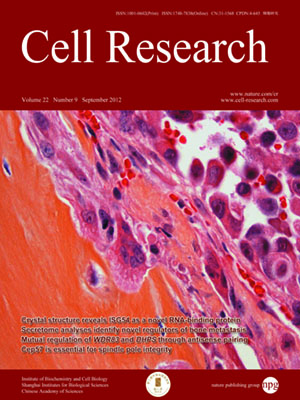
Volume 22, No 9, Sep 2012
ISSN: 1001-0602
EISSN: 1748-7838 2018
impact factor 17.848*
(Clarivate Analytics, 2019)
Volume 22 Issue 9, September 2012: 1356-1373
ORIGINAL ARTICLES
Differential secretome analysis reveals CST6 as a suppressor of breast cancer bone metastasis
Lei Jin1,*, Yan Zhang2,*, Hui Li1, Ling Yao2, Da Fu1, Xuebiao Yao3, Lisa X Xu2, Xiaofang Hu2 and Guohong Hu1
1The Key Laboratory of Stem Cell Biology, Institute of Health Sciences, Shanghai Institutes for Biological Sciences, Chinese Academy of Sciences & Shanghai Jiao Tong University School of Medicine, 225 South Chongqing Rd, Shanghai 200025, China
2School of Biomedical Engineering and Med-X Research Institute, Shanghai Jiao Tong University, 1954 Huashan Rd, Shanghai 200030, China
3Anhui Key Laboratory of Cellular Dynamics & Chemical Biology, University of Science & Technology of China, Hefei, Anhui 230027, China
Correspondence: Guohong Hu, Xiaofang Hu,Lisa X Xu,(ghhu@sibs.ac.cn;xfhu@sjtu.edu.cn; lisaxu@sjtu.edu.cn)
Bone metastasis is a frequent complication of breast cancer and a common cause of morbidity and mortality from the disease. During metastasis secreted proteins play crucial roles in the interactions between cancer cells and host stroma. To characterize the secreted proteins that are associated with breast cancer bone metastasis, we preformed a label-free proteomic analysis to compare the secretomes of four MDA-MB-231 (MDA231) derivative cell lines with varied capacities of bone metastasis. A total of 128 proteins were found to be consistently up-/down-regulated in the conditioned medium of bone-tropic cancer cells. The enriched molecular functions of the altered proteins included receptor binding and peptidase inhibition. Through additional transcriptomic analyses of breast cancer cells, we selected cystatin E/M (CST6), a cysteine protease inhibitor down-regulated in bone-metastatic cells, for further functional studies. Our results showed that CST6 suppressed the proliferation, colony formation, migration and invasion of breast cancer cells. The suppressive function against cancer cell motility was carried out by cancer cell-derived soluble CST6. More importantly, ectopic expression of CST6 in cancer cells rescued mice from overt osteolytic metastasis and deaths in the animal study, while CST6 knockdown markedly enhanced cancer cell bone metastasis and shortened animal survival. Overall, our study provided a systemic secretome analysis of breast cancer bone tropism and established secreted CST6 as a bona fide suppressor of breast cancer osteolytic metastasis.
Cell Research (2012) 22:1356-1373. doi:10.1038/cr.2012.90; published online 12 June 2012
FULL TEXT | PDF
Browse 2401


